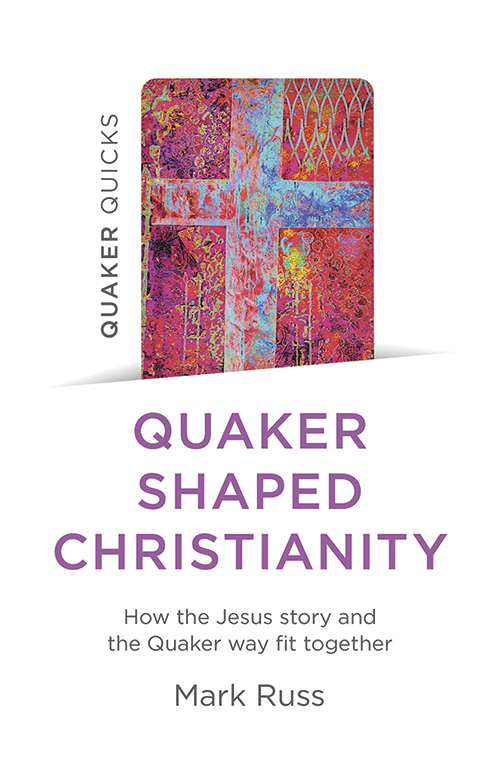
Quaker Shaped Christianity: How the Jesus Story and the Quaker Way Fit Together
Reviewed by William Shetter
August 1, 2023
By Mark Russ. Christian Alternative Books (Quaker Quicks), 2022. 104 pages. $12.95/paperback; $6.99/eBook.
An interview with book author Mark Russ is included in the August 2023 podcast.Before we set out to follow what this book has to say to us, suppose we take a moment to reflect on the status of Christianity in the present-day Quaker way. Many Friends in the unprogrammed tradition feel it is only marginally relevant, and little attention is paid to the Bible, or at least it is regarded as not the last word. Today’s Friends often feel free to supplement their faith with other religious traditions—sometimes several at once—and for some Friends, the Quaker way offers a welcome escape from what they came to experience as the increasingly constraining bonds of rigid doctrine.
Mark Russ is a writer and theologian who works for Woodbrooke in the United Kingdom. He grew up in a non-religious family, and in his teens he had come increasingly to see the spiritual world as, he says, superstitious and hypocritical. Even worse was the circumstance that as a gay person he was at best only marginally accepted. It was in Quakerism that he found the spaciousness to be totally himself.
This book is a recounting of his journey. As he prepares the way in his introduction, he seems to sense—with phrases like “I’m not saying” and “I don’t want to imply”—a resistance to his ideas that may not be as strong as he fears. The narrative unfolds in six chapters, presenting his Quaker view of the essence of Christianity (though in reverse chronological sequence: concluding with the nativity). He begins by establishing what he consistently refers to as “the Jesus story” as the foundation stone of Quaker-shaped Christianity: the story that is the subject of a millennia-long, ongoing conversation about its significance. Russ firmly rejects (and this is where his defensiveness comes in) the widely held view among today’s Friends that Jesus was primarily a teacher, as well as the view that Christianity is one incidental form of universal religious experience. This brings him to the question: “Why just the Jesus story?”
For Friends, universalism is, he says, an attractive spiritual evolution, outgrowing its roots in Christianity and moving toward a faith that minimizes differences and embraces all religious outlooks, these differences being merely “added extras.” But the differences in faiths seem to him so highly significant that he must reject this oversimplification. An important characteristic of the God revealed in Jesus is the unique “spaciousness” that Russ needs and finds in his Quaker tradition; for this, he cites Acts 17:28, saying, “God is the liberating space within which ‘we live and move and have our being.’”
The rest of the Jesus story occupies the following chapters, starting with the return, the “Second Coming,” which he prefers to call God’s “arrival” in the world: not as a one-time event still to come but as a dynamic process. Early Quakers felt the Kingdom of God as a present and an arriving future, and for Russ it is also both now and not-yet, a fruitful tension at the heart of his Quaker-shaped Christianity. The meaning of the Resurrection of Jesus (about which he admits “I can’t pretend to fully understand it”) leads via theological narrative—sometimes a challenge to follow—to his assurance that “the Spirit we experience in meeting for worship is the Spirit of the Resurrected Christ.” As he moves on to the Crucifixion, the meaning of which was at first also elusive for him, he rehabilitates “sin-talk,” not in terms of individual “sinners” but seeing sin as any systematic injustice. His Quaker-shaped perspective is that the cross is God’s response to sin. The final chapter is almost elegantly straightforward: the Nativity is a planting of the seed of the whole Jesus story. While Quakers today are more familiar with the metaphor of the Inner Light, Russ goes back to the strong tradition among early Quakers, such as Isaac Penington, of the “seed of Christ.”
By the time the reader reaches the conclusion of this book, its title may appear a little misleading. Russ does not pretend to have the ambition of giving Christianity a Quaker shape, but his intent is clearly to give the Quaker way a Christian shape.
Correction: A previous version of this review stated that Russ grew up in the fundamentalist tradition. This is not true; he grew up in a non-religious family. The sentence has been corrected.
William Shetter is a member of Bloomington (Ind.) Meeting.



Comments on Friendsjournal.org may be used in the Forum of the print magazine and may be edited for length and clarity.